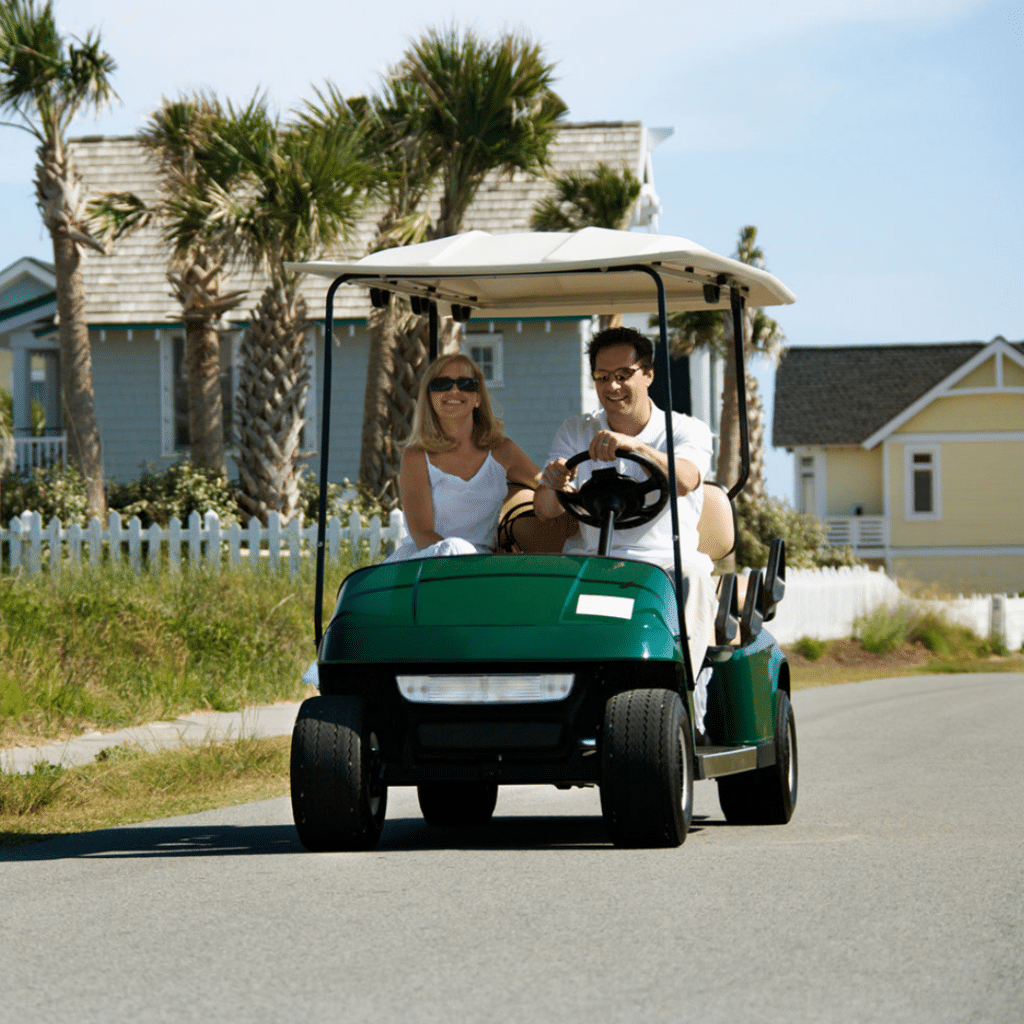By Marcus Fernandez
An extremely popular retirement community in Florida has approximately 120,000 residents. It also has 60,000 golf carts.
Vehicles made to transport golfers during a round of golf have become commonplace on roadways throughout Florida. Counting golf carts in the state is challenging due to the lack of registration or titles required.
One way to get an idea of the proliferation of carts on the streets of Tampa and other Florida communities is to look around you. Golf carts are everywhere. From the beach to the shopping mall, people leave their cars at home and use golf carts to get around town.
If you have a golf cart or are considering buying one, here is some information about golf cart safety and staying legal on the streets.
What is a golf cart?
Florida law classifies golf carts as motorized vehicles for recreational and sporting activities capable of a maximum speed not exceeding 20 mph. Their design is identical to the carts you see at your local golf course.
Do not confuse a golf cart with a low-speed vehicle (LSV). An LSV is a four-wheeled, motorized vehicle capable of achieving a minimum speed of at least 20 mph with a maximum speed that does not exceed 25 mph.
Vehicle owners are responsible for actively registering and titling their LSVs with the state, as well as obtaining personal injury protection (PIP) and property damage liability insurance coverage. Operators of LSVs must possess a valid driver’s license. LSVs may operate on roads where the posted speed limit is no greater than 35 mph if they have the proper equipment, including headlights, taillights, and turn signals.
In contrast to LSVs, golf carts cannot operate on roads with speed limits greater than 30 mph except under the following conditions:
- Crossing a roadway with a speed limit above 30 mph intersecting a street where golf carts are permitted.
- When on a road intersecting a golf course, as long as signs are posted permitting golf carts to be on it.
- When on a road intersecting a mobile home park, as long as signs are posted permitting golf carts to be on it.
Unlike LSVs, the state does not require golf carts to be registered or titled. The state also does not require insurance coverage. People operating golf carts may do so without a driver’s license if they are at least 14 years old.
Recent legislation about golf cart operation
A new law takes effect in Florida on October 1, 2023, imposing the following restrictions on golf cart operators:
- Instead of permitting anyone 14 years and older to operate a golf cart, the new legislation requires operators younger than 18 to have a valid driver’s license or learner’s permit.
- Operators at least 18 years old may operate golf carts as long as they have a valid driver’s license or another form of government-issued photo identification.
The new law leaves it to local municipalities to determine where and when golf carts may legally operate, which is similar to the practice under existing legislation.
Local communities have the right to establish rules about the equipment for golf carts to operate on roadways. For example, golf carts may legally operate on Tampa roads with speed limits that do not exceed 35 mph. Communities may require that cart owners install headlights, turn signals, seat belts, or other safety equipment.
Who is at fault in a golf cart accident?
Golf carts used on public roads must comply with Florida insurance laws requiring $10,000 in personal injury protection and $10,000 in property damage coverage. Check with the rental agency about insurance coverage before taking the vehicle on the road.
When an accident occurs, determining who was at fault in causing it requires carefully reviewing the facts. Negligent or reckless behavior that caused or contributed to causing a crash could make a driver liable for compensating other parties who sustained injuries.
Golf cart safety
The National Safety Council reports that a 10-year study of injuries related to the operation of golf carts revealed that more than 156,000 people suffered injuries from accidents. The study pointed to the lack of basic safety features, such as seat belts, as one of the reasons for the number of injuries requiring emergency department treatment.
The following tips for golf cart safety may help you avoid accidents and injuries:
- Do not overload a golf cart with more passengers than there are seats.
- Do not let anyone stand while the golf cart is in motion.
- If the cart has seat belts, wear one.
- Do not operate while drunk or impaired by drugs or alcohol.
- Obey all traffic laws and rules of the road.
- Seek shelter in the event of lightning.
- Use hand signals when operating a cart not equipped with brake lights and turn signals.
Do not allow yourself to become distracted while operating a golf cart. It’s easy to let the scenery or conversations with passengers divert attention from the road and the task of driving, but distracted driving can lead to accidents.
Are golf carts required to have seat belts in Florida?
Yes! In this case, golf carts are subject to the same laws as LSVs. Each seat in a golf cart should be equipped with a seatbelt.
Can You Drive a Golf Cart Around the Neighborhood?
This depends on your community. Local communities may establish rules about the equipment required for street legal golf carts. For example, you may legally operate a golf cart on Tampa road with speed limits not exceeding 35 mph.
Florida law and golf carts on streets
Golf carts, the kind you see on golf courses, cannot have maximum speeds above 20 mph, nor can they be operated on public roads where the posted speed limit exceeds 30 mph. Even then, they can only be used on roads intersecting golf courses and mobile home parks. So, how did the vehicles designated by law as limited to recreational and sporting activities end up on the streets of Tampa?
State law allows the operation of golf carts on public roads when modified and equipped to meet the requirements for low-speed vehicles (LSVs). The following are some of the equipment requirements that LSVs must meet to operate legally on public streets in Tampa:
- Headlamps
- Taillights
- Front and rear directional signals
- Sideview and rearview mirrors
- Windshield
- Seat belts to accommodate all riders
- Parking brake
You’ll need a valid driver’s license to rent and operate one of the golf carts available in Tampa. An LSV, or a golf cart modified to meet LSV standards for use on the street, requires a driver’s license to operate.
Golf carts modified and equipped to meet the standards for LSVs may operate on any road with a speed limit of 35 mph or less. They also may operate at speeds up to 25 mph instead of the 20 mph top-speed restriction that applies to standard, unmodified golf carts.
Injured in a Golf Cart Accident? Contact KFB Law Today!
In the event of a golf cart accident causing injury, you hold the right to pursue compensation from the individual accountable for the incident. Learn more about your rights and how to enforce them
during a free consultation with an experienced Tampa personal injury attorney. Contact KFB Law personal injury attorneys today.



